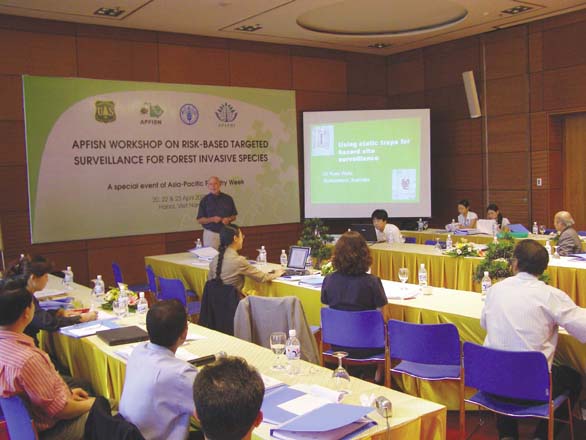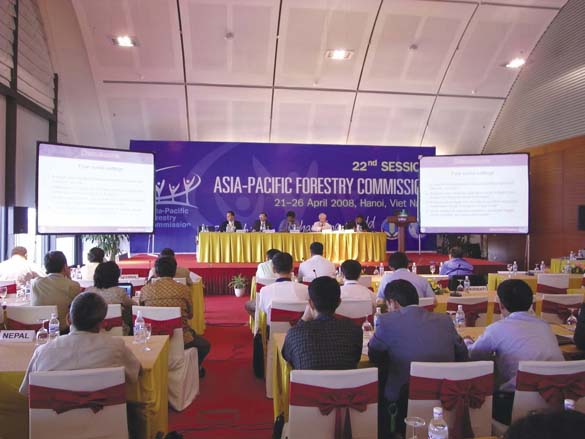On behalf of the Government of Viet Nam, it is of my great honor to welcome you all to Hanoi and the first Asia-Pacific Forestry Week. Viet Nam is honored and proud to be the host of this landmark forestry event.
In Viet Nam, the forestry sector plays important roles in the national economy, environmental protection, biodiversity conservation, livelihoods improvement and poverty reduction. Recognizing the significance of forests to rural livelihoods, the Government of Viet Nam has taken the initiative to allocate user rights of forest resources to local communities and households, thereby creating more jobs and providing livelihoods support to local people.
Due to its mountainous terrain and long coast line, Viet Nam is considered to be one of the world’s most vulnerable countries to climate change. In fact, the livelihoods of tens of millions of Vietnamese people will suffer from climate change in the coming years. Sustainable management of Viet Nam’s forests, especially the mangrove forests, will be important in mitigating the negative impacts caused by climate change and global warming.
In recent decades, the Government of Viet Nam has put great effort into improving the management of forests and forest land and promoting sustainable forest management. In the 1990s, the Government implemented strong and drastic measures to reduce deforestation and increase forest cover through various programs and projects on forest protection and development. The Government of Viet Nam is strongly committed to continue implementing comprehensive measures to achieve the ultimate goal of sustainable forest management.
I hope that, during the Asia-Pacific Forestry Week, all participants will actively engage in sharing experiences and perspectives and discuss openly in order to seek solutions to the common challenges and obstacles in forestry that we face in the Asia-Pacific region.
I wish you, distinguished delegates, guests and participants, fruitful discussions and the Asia-Pacific Forestry Week, great success. I also wish you a pleasant stay in Hanoi and hope that you will take the time to enjoy some of the beauty, friendly people and multi-cultural cuisine that the city has to offer.
Mr. Chairperson, Your Excellency, Distinguished participants, Dear colleagues;
Good Morning,It is my pleasure and privilege to be with you this morning to participate in the first forestry week ever held in the Asia-Pacific region. Most key players in the forest sector in this region have come together. On behalf of all my colleagues I wish to extend my sincere thanks to the Government of Viet Nam and in particular the Ministry of Agriculture and Rural Development for all preparatory work and arrangements for this land mark event. With more than 500 participants, exceeding the wildest speculation, this must have been an extremely challenging task. Let me congratulate our Vietnamese friends for this excellent effort to make this first forestry week a reality. I would also like to express my thanks to the various partner organizations for jointly organizing this event. My thanks go also to the Executive Committee of the Asia-Pacific Forestry Commission for their able guidance in pursuing a broad approach and enabling wide participation. Through this pioneering effort, the Commission is setting new trends and standards and stimulating other regions. The theme of the week is “Forestry in a changing world” - a theme extremely relevant in this region. The 21st century is being referred to as the Asian century, above all because of continued rapid economic growth in the region. Many of the biggest changes in the world are taking place outside the forest sector. Global population is expected to increase from 6 billion to nine billion people by the middle of the century with the Asia-Pacific region accounting for about half of the increase.
Food security is increasingly threatened by a combination of macro-economic pressures, climate change, and political instability. Food and fuel prices are soaring, and the long-term outlook suggests that food security will be one of human-kind’s major challenges for years to come. The interface between forests and agriculture is a worldwide important issue today, but it will likely become even more so in the years ahead. The challenge of the forest sector is to understand the forces that are shaping the world and to optimise the economic, social and environmental performance of forestry. In some ways this is already happening. The region has a long history of forest management. It is also showing early signs of reversal of deforestation, largely due to the rapid pace of afforestation in China, India and Viet Nam. The region has also witnessed a rapid expansion of investments in wood industries. In fact, the Asia-Pacific accounts for the largest share in the overall increase in global trade of forest products. Despite these positive trends, we are far from accomplishing sustainable forest management. As the economies undergo rapid changes and globalization accelerates, forestry will be confronted with many challenges that require new skills to be met. Firstly, reducing poverty will remain at the top of agenda of development in the region. Among the poorest in the region are the forest-dependent indigenous communities who have been marginalised and often their rights to land and forests ignored. No conservation efforts are likely to succeed without empowerment of local communities. Secondly, climate change will remain an overarching environmental issue and presumably considerable new resources will be allocated to reduce deforestation and forest degradation. Forestry will need to play an important role both in the mitigation and adaptation strategies. Our challenge is to develop a wide array of market and non-market mechanisms appropriate to the diverse conditions, encouraging sustainable production and use of a variety of products and services from the forests. Thirdly, a related issue is the escalation of energy costs and its impacts on the forest sector. Improved, competitive technologies for producing not only new forms of wood fuel, but also liquid biofuel from cellulose, may cause a major change in the forestry sector. Energy costs are also one of the key factors in the recent high increase in food prices. Clearly, the forest sector does not stand alone. One of our greatest challenges is to find new ways to work more effectively with other sectors. FAO, in collaboration with all the countries in the region and many partner institutions, has embarked on the Asia-Pacific Forestry Sector Outlook Study with the objective of providing the larger picture of change in the region and what may be done to get a better grip on the future.
In dealing with the future, I wish to draw your attention to the urgent need of reinventing national forest institutions. Reforming the institutions to make them efficient in the delivery of services and accountable to the public is critical if we want to face the challenges of the 21st century. FAO itself has embarked on a major reform process. The FAO Conference in November 2007 endorsed the main recommendations of the Independent External Evaluation. A new strategic framework is under preparation for consideration by a Special Session of the FAO Conference in the latter part of 2008. In line with the reform process, I have launched a review of the FAO Strategy for Forestry and I eagerly look forward to receiving your views and feed back during this week. Let me reiterate FAO’s commitment to strengthen the Regional Forestry Commissions and the implementation of the recommendations they make. The linkages between the regional commissions and global dialogue at COFO and other important processes must be strengthened. This is particularly important given the new Non-Legally Binding Instrument on All Types of Forests (NLBI) adopted by the United Nations Forum on Forests (UNFF) and the UN General Assembly, and the UNFF’s new Multi-Year Programme of Work that seeks inputs from regional entities. The entire Asia-Pacific Forestry Week should be looked upon as contributing to the UNFF process. The Bali decisions of the UN Framework Convention on Climate Change (UNFCCC) underscored the important role of forests in adaptation to and mitigation of climate change, including reduction of emissions from deforestation and forest degradation. Because of this, the forest sector has risen to new heights on the international political agenda. The APFC and the member countries have both a challenge to tap on these developments as well as an opportunity to contribute in shaping the future global debate, including at UNFF8 and the post-Kyoto negotiations. Yet, we in FAO place a great importance to the role of APFC as an effective regional forum supporting member countries and other stakeholders in accomplishing better management of forest and tree resources in the region. Finally, I would like to once again convey FAO’s sincere thanks to the Government of Viet Nam for hosting the Asia-Pacific Forestry week in Hanoi. With an unprecedented level of participation, I can understand the enormous logistical problems that are to be confronted. Without the whole-hearted support from our hosts, it would be impossible to organize such a conference.

We have a very interesting programme during this week. In response to broad longterm challenges in the region, the Asia-Pacific Forestry Week focuses on three thematic areas: (i) forests and climate change; (ii) forests and human well-being; and (iii) trade and forest law enforcement. I am personally looking forward to the various discussions and recommendations that will go a long way to better understand the challenges of a changing world and how we may meet them.
Thank you.
